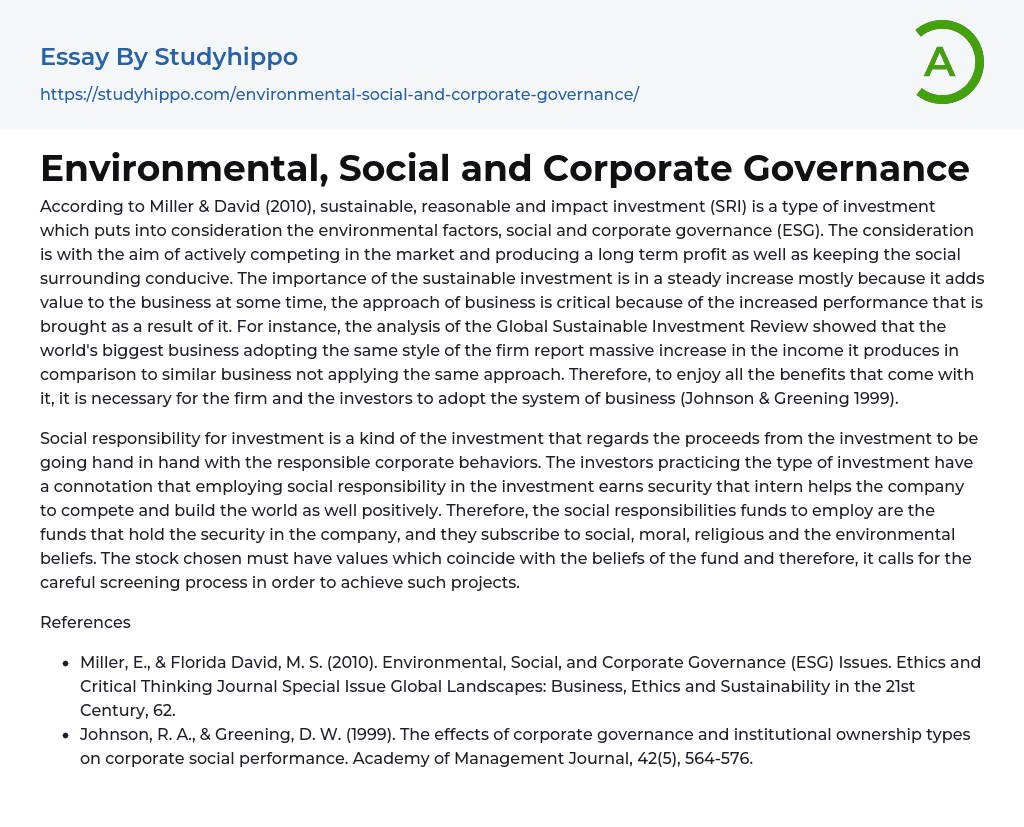According to Miller & David (2010), sustainable, reasonable and impact investment (SRI) is a type of investment which puts into consideration the environmental factors, social and corporate governance (ESG). The consideration is with the aim of actively competing in the market and producing a long term profit as well as keeping the social surrounding conducive. The importance of the sustainable investment is in a steady increase mostly because it adds value to the business at some time, the approach of business is critical because of the increased performance that is brought as a result of it. For instance, the analysis of the Global Sustainable Investment Review showed that the world's biggest business adopting the same style of the firm report massive increase in the income it produces in comparison to similar business not applying the same approac
...h.
Therefore, to enjoy all the benefits that come with it, it is necessary for the firm and the investors to adopt the system of business (Johnson ; Greening 1999). Social responsibility for investment is a kind of the investment that regards the proceeds from the investment to be going hand in hand with the responsible corporate behaviors. The investors practicing the type of investment have a connotation that employing social responsibility in the investment earns security that intern helps the company to compete and build the world as well positively. Therefore, the social responsibilities funds to employ are the funds that hold the security in the company, and they subscribe to social, moral, religious and the environmental beliefs. The stock chosen must have values which coincide with the beliefs of the fund and therefore, it calls for the carefu
screening process in order to achieve such projects.
References
- Miller, E., ; Florida David, M. S. (2010). Environmental, Social, and Corporate Governance (ESG) Issues. Ethics and Critical Thinking Journal Special Issue Global Landscapes: Business, Ethics and Sustainability in the 21st Century, 62.
- Johnson, R. A., ; Greening, D.
W. (1999). The effects of corporate governance and institutional ownership types on corporate social performance. Academy of Management Journal, 42(5), 564-576.
- Animal Welfare essays
- Zoo essays
- Plastic essays
- Waste Management essays
- Climate Change essays
- Global Warming essays
- Conservation essays
- Recycling essays
- Accounting essays
- Andrew Carnegie essays
- Automation essays
- Business Cycle essays
- Business Intelligence essays
- Business Model essays
- Business Operations essays
- Business Software essays
- Cooperation essays
- Cooperative essays
- Corporate Social Responsibility essays
- Corporation essays
- Customer Relationship Management essays
- Family Business essays
- Franchising essays
- Harvard Business School essays
- Harvard university essays
- Human Resource Management essays
- Infrastructure essays
- Inventory essays
- Logistics essays
- Management essays
- Manufacturing essays
- Market essays
- Marketing essays
- Multinational Corporation essays
- News Media essays
- Online Shopping essays
- Quality Assurance essays
- Richard Branson essays
- Sales essays
- Selling essays
- Shopping Mall essays
- Small Business essays
- Starting a Business essays
- Stock essays
- Strategy essays
- Structure essays
- Trade Union essays
- Waste essays
- Air Pollution essays
- Carbon Dioxide essays




